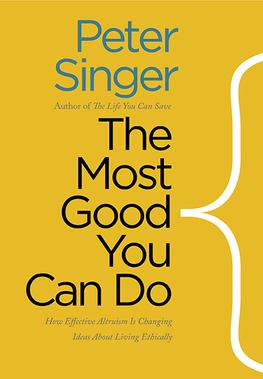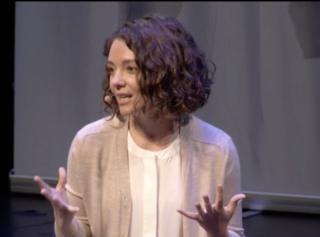
Kara Anne Swisher is an American journalist. She has covered the business of the internet since 1994. As of 2023, Swisher was a contributing editor at New York Magazine, the host of the podcast On with Kara Swisher, and the co-host of the podcast Pivot.

Charity Navigator is a charity assessment organization that evaluates hundreds of thousands of charitable organizations based in the United States, operating as a free 501(c)(3) organization. It provides insights into a nonprofit's financial stability, adherence to best practices for both accountability and transparency, and results reporting. It is the largest and most-utilized evaluator of charities in the United States. It does not accept any advertising or donations from the organizations it evaluates.

Charity is the voluntary provision of assistance to those in need. It serves as a humanitarian act, and is unmotivated by self-interest. Various philosophies about charity exist, with frequent associations with religion.
GiveWell is an American non-profit charity assessment and effective altruism-focused organization. GiveWell focuses primarily on the cost-effectiveness of the organizations that it evaluates, rather than traditional metrics such as the percentage of the organization's budget that is spent on overhead.

Olivia "Liv" Boeree is a British science communicator, television presenter, host of the Win-Win Podcast, and former professional poker player. She is a World Series of Poker (WSOP) and European Poker Tour (EPT) champion, and is the only female player in history to win both a WSOP bracelet and an EPT event. Boeree is a 3× winner of the Global Poker Index European Female Player of the year. As of September 2021, having retired in late 2019, Boeree still ranks among the top ten women in poker history in terms of all-time money winnings.

Dustin Aaron Moskovitz is an American billionaire internet entrepreneur who co-founded Facebook, Inc. with Mark Zuckerberg, Eduardo Saverin, Andrew McCollum and Chris Hughes. In 2008, he left Facebook to co-found Asana with Justin Rosenstein. In March 2011, Forbes reported Moskovitz to be the youngest self-made billionaire in the world, on the basis of his then 2.34% share in Facebook. As of October 2023, his net worth is estimated at US$18.0 billion by the Bloomberg Billionaires Index.
Business Insider is a New York City–based multinational financial and business news website founded in 2007. Since 2015, a majority stake in Business Insider's parent company Insider Inc. has been owned by the German publishing house Axel Springer. It operates several international editions, including one in the United Kingdom.

LessWrong is a community blog and forum focused on discussion of cognitive biases, philosophy, psychology, economics, rationality, and artificial intelligence, among other topics.

Holden Karnofsky is an American nonprofit executive. He is a co-founder and Director of AI Strategy of the research and grantmaking organization Open Philanthropy. Karnofsky co-founded the charity evaluator GiveWell with Elie Hassenfeld in 2007 and is vice chair of its board of directors.

Alice Crary is an American philosopher who currently holds the positions of University Distinguished Professor at the Graduate Faculty, The New School for Social Research in New York City and Visiting Fellow at Regent's Park College, University of Oxford, U.K..
Effective altruism (EA) is a 21st-century philosophical and social movement that advocates "using evidence and reason to figure out how to benefit others as much as possible, and taking action on that basis". People who pursue the goals of effective altruism, sometimes called effective altruists, may choose careers based on the amount of good that they expect the career to achieve or donate to charities based on the goal of maximising positive impact. They may work on the prioritization of scientific projects, entrepreneurial ventures, and policy initiatives estimated to save the most lives or reduce the most suffering.
The Canaanite god Moloch was the recipient of child sacrifice according to the account of the Hebrew Bible, as well as Greco-Roman historiography on the god of Carthage. Moloch is depicted in John Milton's epic poem Paradise Lost as one of the greatest warriors of the rebel angels, vengeful and militant.
Earning to give involves deliberately pursuing a high-earning career for the purpose of donating a significant portion of earned income, typically because of a desire to do effective altruism. Advocates of earning to give contend that maximizing the amount one can donate to charity is an important consideration for individuals when deciding what career to pursue.

William David MacAskill is a Scottish philosopher and author, as well as one of the originators of the effective altruism movement. He was a Research Fellow at the Global Priorities Institute at the University of Oxford, co-founded Giving What We Can, the Centre for Effective Altruism and 80,000 Hours, and is the author of Doing Good Better (2015) and What We Owe the Future (2022), and the co-author of Moral Uncertainty (2020).

Vox is an American news and opinion website owned by Vox Media. The website was founded in April 2014 by Ezra Klein, Matt Yglesias, and Melissa Bell, and is noted for its concept of explanatory journalism. Vox's media presence also includes a YouTube channel, several podcasts, and a show presented on Netflix. Vox has been described as left-leaning and progressive.

The Most Good You Can Do: How Effective Altruism Is Changing Ideas About Living Ethically is a 2015 Yale University Press book by moral philosopher and bioethicist Peter Singer describing and arguing for the ideas of effective altruism. As a follow-up to The Life You Can Save, which makes the moral argument for donating money to improve the lives of people in extreme poverty, the new book focuses on the broader question of how to do the most good.

Curtis Guy Yarvin, also known by the pen name Mencius Moldbug, is an American blogger. He is known, along with philosopher Nick Land, for founding the anti-egalitarian and anti-democratic philosophical movement known as the Dark Enlightenment or neoreactionary movement (NRx).
Open Philanthropy is a research and grantmaking foundation that makes grants based on the doctrine of effective altruism. It was founded as a partnership between GiveWell and Good Ventures. Its current chief executive officer is Alexander Berger, and its main funders are Cari Tuna and Dustin Moskovitz. Moskovitz says that their wealth, worth $16 billion, "belongs to the world. We intend not to have much when we die."

Cari Tuna is an American nonprofit businessperson. Formerly a reporter for The Wall Street Journal, she co-founded and works for the organizations Open Philanthropy and Good Ventures.

Kelsey Piper is an American journalist who is a staff writer at Vox, where she writes for the column Future Perfect, which covers a variety of topics from an effective altruism perspective. While attending Stanford University, she founded and ran the Stanford Effective Altruism student organization. Piper blogs at The Unit of Caring.














